The 2020 Mac Mini Unleashed: Putting Apple Silicon M1 To The Test
by Andrei Frumusanu on November 17, 2020 9:00 AM ESTBenchmarks: Whatever Is Available
As we’ve had very little time with the Mac mini, and the fact that this not only is a macOS system, but a new Arm64-based macOS system, our usual benchmark choices that we tend to use aren’t really available to us. We’ve made due with a assortment of available tests at the time of the launch to give us a rough idea of the performance:
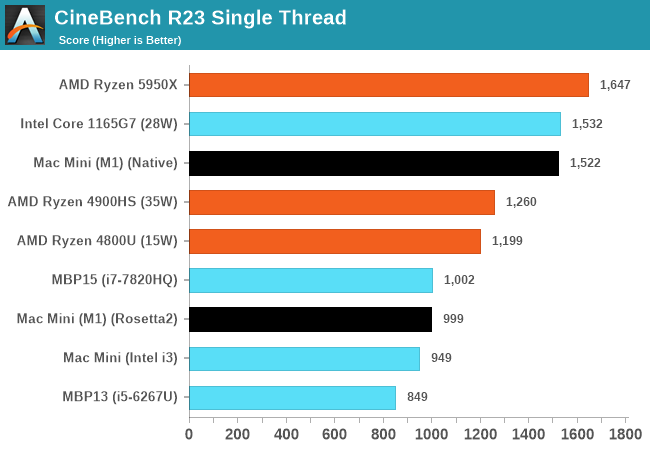
One particular benchmark that sees the first light of day on macOS as well as Apple Silicon is Cinebench. In this first-time view of the popular Cinema4D based benchmark, we see the Apple M1 toe-to-toe with the best-performing x86 CPUs on the market, vastly outperforming past Apple iterations of Intel silicon. The M1 here loses out to Zen3 and Tiger Lake CPUs, which still seem to have an advantage, although we’re not sure of the microarchitectural characteristics of the new benchmark.
What’s notable is the performance of the Rosetta2 run of the benchmark when in x86 mode, which is not only able to keep up with past Mac iterations but still also beat them.
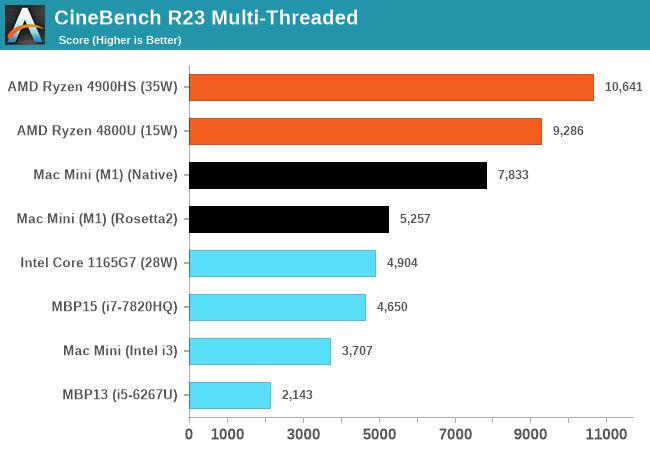
In the multi-threaded R23 runs, the M1 absolutely dominates past Macs with similar low-power CPUs. Just as of note, we’re trying to gather more data on other systems as we have access to them, and expand the graph in further updates of the article past publishing.
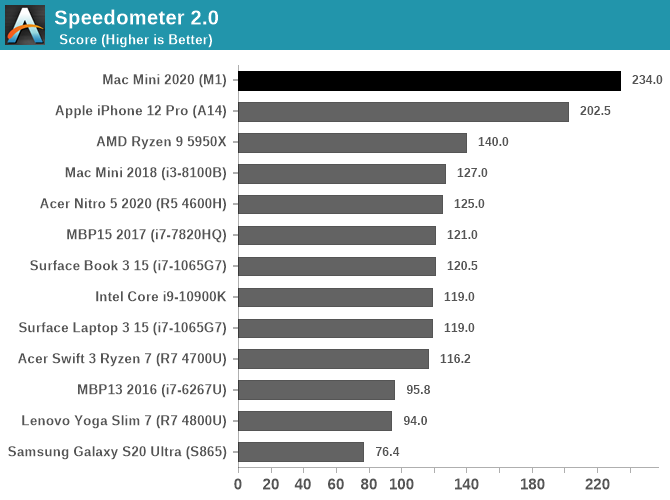
In browser-benchmarks we’ve known Apple’s CPUs to very much dominate across the landscape, but there were doubts as to whether this was due to the CPUs themselves in the iPhone or rather just the browsers and browser engines. Now running on macOS and desktop Safari, being able to compare data to other Intel Mac systems, we can come to the conclusion that the performance advantage is due to Apple’s CPU designs.
Web-browsing performance seems to be an extremely high priority for Apple’s CPU, and this makes sense as it’s the killer workload for mobile SoCs and the workload that one uses the most in everyday life.
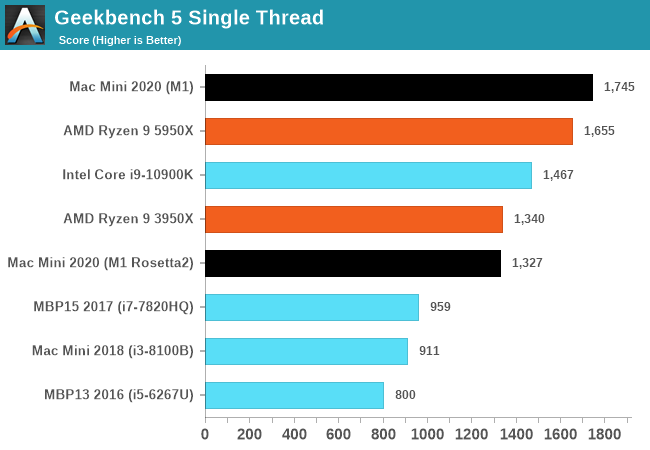
In Geekbench 5, the M1 does again extremely well as it actually takes the lead in our performance figures. Even when running in x86 compatibility mode, the M1 is able to match the top single-threaded performance of last generation’s high-end CPUs, and vastly exceed that of past iterations of the Mac mini and past Macbooks.
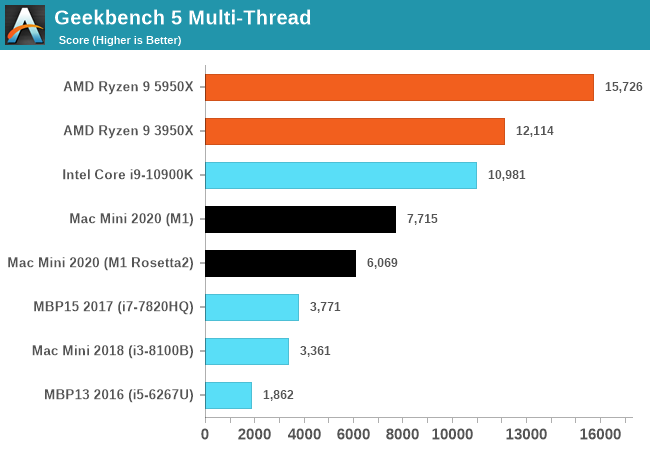
Multi-threaded performance is a matter of core-count and power efficiency of a design. The M1 here demolishes a 2017 15-inch Macbook Pro with an Intel i7-7820HQ with 4 cores and 8 threads, posting over double the score. We’ll be adding more data-points as we collect them.


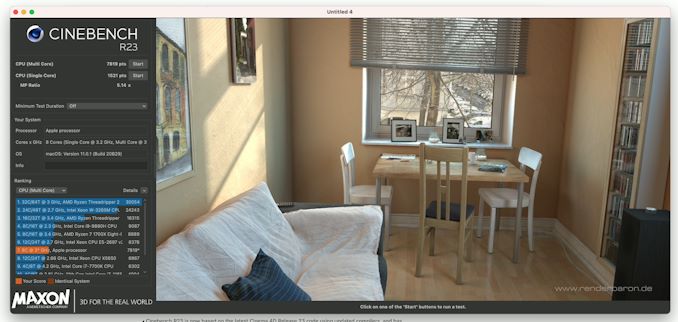








682 Comments
View All Comments
GeoffreyA - Saturday, November 21, 2020 - link
To find truth here, it's important to keep the 5950X out of the picture, and look closely at Renoir and the M1. As others have already pointed out, 15W Renoir is not so far behind in single-threaded performance (which is the building block of everything else). Zen 3 + 5 nm should put them on a roughly equal footing. Give or take. Also, according to the TGL review, I see that 15W Renoir draws about 23W on a multi-threaded load: similar to the M1 as far as I can tell.* And Z3 uses about the same, or even less, power than Z2.This suggests that Apple's and AMD's microarchitectures, according to Cinebench and some of SPEC at any rate, are roughly the same from a performance and power point of view. Great work from Apple, certainly. But hardly a slaughter. Seems these old-fashioned x86 CPUs, while shackled by the variable-length chains, are able to hold up against ARM after all. Who knows, maybe Rosetta 3 will be translating back in a decade's time ;)
* Did see a test, on Notebookcheck, where the 4800U drew about 50W, but that's in Prime95 and likely using a higher than 15W TDP. A review of the Yoga Slim 7 on Ultrabookreview showed a range of TDPs.
GeoffreyA - Wednesday, November 18, 2020 - link
As for the Pentium M and Athlon 64, I am making that statement from memory and need to double-check the actual review: I remember Anand did that test a long time ago, before the Core days, and what I remember (only read it a few years ago) was that the Pentium M was too close for comfort to the K8, even beating it quite a few times.Spunjji - Thursday, November 19, 2020 - link
You're 100% accurate with that recollection. I bought a Pentium M at the time and rolled it into a desktop system because I couldn't afford an Athlon 64. It could run passively under a Zalman Flower cooler with a pin mod that took it from 1.6Ghz to just over 2Ghz, and at that rate it was competitive with (not better than!) some of the best gaming systems out there.This is quite reminiscent of that - a new low power CPU showing up and bloodying the nose of the incumbent heavyweight(s). Only difference is we don't get to build this into our own systems :/
GeoffreyA - Friday, November 20, 2020 - link
Great memory of your Pentium M clocked at 2 GHz. Though I never owned one, I hold this CPU in very high regard, simply because it was such an excellent piece of work (nice intelligent additions on top of the Pentium III's design) and the foundation of Core. Its surprising performance against the "infallible" Athlon 64 was a foreshadowing of things to come.GeoffreyA - Friday, November 20, 2020 - link
As for me, I got an Athlon 64 back then, but it was before the X2 came out, so prices weren't that bad. Wasn't very high-end though: the Socket 754 3000+ clocked at 2 GHz. So I missed out on Socket 939 and dual channel memory. My motherboard was a Chaintech VNF3-250. Unfortunately, it came with a no-name brand 300W PSU, which slowly fried something over time. All in all, could barely boot after just 4 years.Spunjji - Monday, November 23, 2020 - link
The AOpen MoDT board I built my Pentium M system with failed after just under a year - and that was with a very high-quality PSU. The RMA replacement failed again in a similar time-frame. I think a lot of boards from that era just weren't that great!GeoffreyA - Thursday, November 26, 2020 - link
Yes, those old boards were a mess, packed to the brim with components. It's startling to reflect how clean boards have become over the past decade.trboyden - Tuesday, November 17, 2020 - link
Still seems to be a lot of fanboyish behavior when it comes to Apple performance testing. Apple has long been known not to put the best performing Intel CPU in their machines which is why they always suffered performance-wise against performance oriented PCs. Then you have these test results where the tester claims a win for Apple when the M1 can't even beat an Intel 1165G7 processor at 10nm and 4 cores. Geekbench scores have always been suspect, so no one really trusts those. The Cinebench scores are probably the closest to reality, but the testing suffers from a lack of testing against modern Intel 8-core processors such as the i9-10885H which themselves are still only 14nm. I think the Apple ARM chip is definitely going to be competitive, but it is far too early to call it a dominant chip. With Apple turning all of their devices into glorified tablets running mobile apps, it is not exactly the best platform to benchmark the performance of a working class PC.bernstein - Tuesday, November 17, 2020 - link
one should note that performance doesn't scale with power... or rather not linearly. on the other hand having the fastest core that uses less power than competitors mostly negates this, as scaling from a 4-core to 16-core should be easily doable. this would put them at a roughly comparable mc-perf than a ryzen 5950xxenol - Tuesday, November 17, 2020 - link
I'd argue the M1's GPU is a much bigger eyebrow raiser than the CPU. 21W system power consumption (so GPU is probably floating around 12-15W) yet gets within spitting distance of the 1650. Even if we take the laptop version, it's still 35W-50W for just the graphics module. That's nuts.Though one has to wonder how much inefficiencies on the 1650 are due to software inefficiencies.